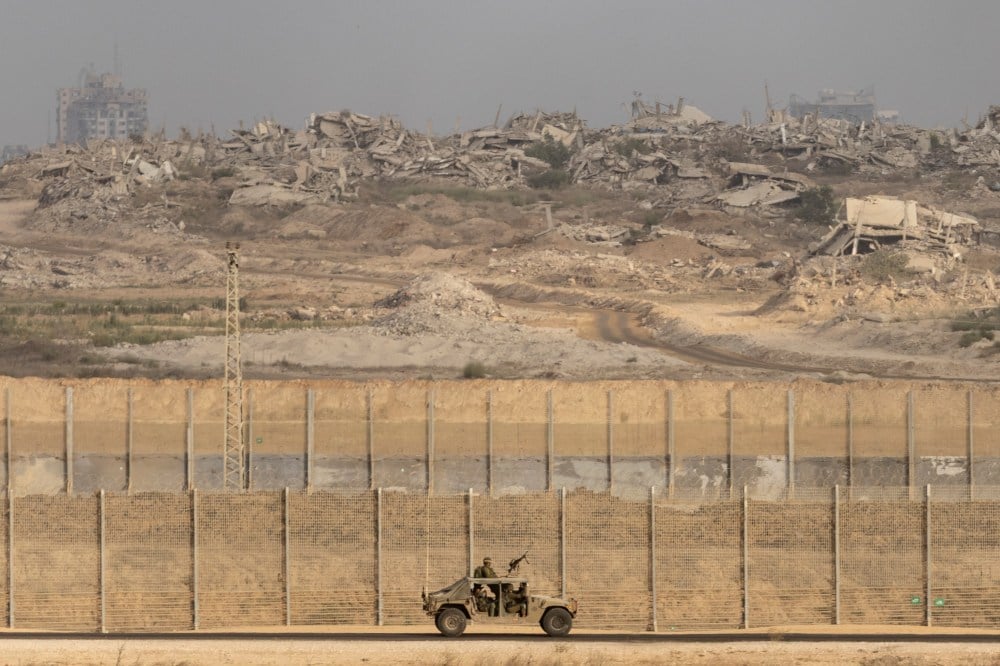Exactly two years ago, on Oct. 7, 2023, Hamas crossed into Israel and killed around 1,200 people. It was an awful, inhumane attack. But that day also triggered a chain reaction of awful things over a long and bloody 24 months. Between airstrikes and ground incursions, more than 65,000 Palestinians in Gaza have been killed. A United Nations’ commission of inquiry said that Israel is committing a genocide—an assessment that the Israeli human rights organization B’Tselem concurs with. More than 90 percent of homes in Gaza are estimated to be damaged or destroyed. U.N. food security experts have said that there is a famine in Gaza City.
There have also been ripple effects far beyond Gaza. There was a war with Iran, which the United States got directly involved in. Israel conducted airstrikes in Lebanon, Syria, Yemen, and even Qatar, leading many experts to question whether the rules of law apply anymore. And beyond all of this, there is a profound global polarization over this issue: Communities and countries are bitterly divided over the very facts that I’ve just laid out.
On the latest episode of FP Live, I wanted to take a big step back and assess how the world has changed since Oct. 7. My guest was FP columnist Stephen Walt, a Harvard University professor and the co-author of the 2007 book The Israel Lobby. Subscribers can watch the full discussion on the video box at the top of this page or follow the FP Live podcast. What follows here is a lightly edited and condensed transcript.
Ravi Agrawal: Two years on from Oct. 7, 2023, are you surprised by where we are?
Stephen Walt: In some respects, yes. I don’t think anyone could have anticipated the full range of events that have taken place since that fateful day or how far-reaching some of the events have been. I think we’ve seen a real transformation of the region in some fundamental ways and also the way that other parts of the world—many parts of global south—are now looking at the Middle East.
I always think back to the statement that National Security Advisor Jake Sullivan made in his infamous Foreign Affairs article, published a few days before Oct. 7, where he said the Middle East was “quieter than it has been for decades.” That may have been true on the day that it was published, but that masked what was really going on beneath the surface. No one would argue that the Middle East is quieter today than it was back then.
RA: You mentioned transformational changes. What are they?
SW: We’ve seen a fundamental change in the relative power of a number of the actors who have been players in that region for quite some time. Even if Hamas survives, it’s much weaker than it was before. Hezbollah has been substantially weakened, and the political arrangements in Lebanon have been altered. The Assad regime has fallen, not strictly as a result of what happened here, but this was clearly a contributing factor. Iran’s nuclear program has not been eliminated, but it’s been severely cut back. And finally, the general sense that the United States was able to somewhat manage events in the region has been tarnished. Countries that were previously very confident in American support are less confident than they would have been and are starting to look for alternative arrangements. I think all of this is direct or indirect fallout from the events that began on Oct. 7.
RA: Let’s talk about international law. Two years ago, most countries argued that Israel has every right to defend itself. Today, most of those countries would say that Israel went too far, not only in Gaza, but with cross-border attacks—most recently in Qatar, which Israeli Prime Minister Benjamin Netanyahu has now formally apologized for. When the dust settles on this conflict, what will the longer-term impact on international law and impunity be?
SW: International law had been taking a beating before Oct. 7 from a number of different fronts. The war in Ukraine is an obvious example, as well as some of the actions the United States took as part of the global war on terror. So, it didn’t begin here.
But much of it depends on whether or not the perpetrators of these heinous acts are ever held accountable. If Israeli officials who may have been responsible for war crimes or a genocide are ultimately held accountable, that will reinforce the broad sense that certain actions should never be permitted or tolerated. It would similarly strengthen things if Hamas officials who were responsible for the attacks on Oct. 7—those who have not been killed—are ultimately held accountable, not merely by Israeli action, but by the global community.
But we have to worry that most of the perpetrators here are likely to get off scot-free—that the major powers are not going to hold them accountable. As one person said after the war in Gaza began, the next time the United States wants to talk to us about a rules-based order as it has about Ukraine, we’re simply not going to pay any attention. That’s all over now. That’s a worrisome development if you believe that international law and existing norms have constraining effects on state behavior. We’re going to be moving into a much more lawless world.
RA: I have a similar question about the United Nations. The U.N.’s dysfunction and the polarization far predate Oct. 7, 2023. But it is telling that a key U.N. commission of inquiry has now termed what’s happening in Gaza as a genocide, while Israel and the United States frequently brand the U.N. as antisemitic. Has that dysfunction accelerated in the last couple of years?
SW: Any international institution depends upon support from great powers to have credibility and the capacity to hold members accountable. If the great powers begin to lose confidence in the institution, then its effectiveness is likely to decline. That’s what’s happening here. Because the U.N. has taken positions at odds with the U.S. government, or some governments close to the United States like Israel, you see American support declining, even getting actively in the way. When the United States threatens to sanction officials at the International Criminal Court, that’s evidence that a major power—the world’s most powerful country—is actively undermining a normative environment that enjoys support from much of the international community.
The danger here is that a lawless world is even worse than one where the institutions don’t work perfectly. Any system of states requires some set of rules to manage those relations. If the current order to include the United Nations gradually falls apart and loses all efficacy, what’s going to replace it and who’s going to be writing those new rules?
What worries me about the American position now is that we are making it easier for countries like China and even Russia to argue that the American rules-backed order is meaningless and that they should be given a larger voice in shaping the normative environment of the future. Again, whether that happens or not largely depends on whether the perpetrators here are ultimately held accountable and whether the U.N. is able to reform itself. But absent active American support for that, I think it’s relatively unlikely.
RA: You’re a big hit with our subscriber base. Here’s a question from one of them: Is there an international relations theory that explains the situation you’re describing?
SW: There are several that contribute to this. At this point, one can’t rule out the impact of individuals. A different American president might have acted differently than Joe Biden did when he was president, given his strong commitment to Israel. Certainly, a different president than Donald Trump might be acting differently now. Theories that focus on the role of individuals do play a role here.
I also think that my old friend realism is pretty clear here. What realism tells you is that, morality aside, states are going to do what they think is necessary to make themselves more secure. They’re going to tear up the rule book if they feel really insecure or see tempting opportunities. If you look at the way Israel has behaved, that’s an indication of something like that happening.
Realism also reminds us that the United States is still in a very favorable position. It can do a variety of things that may not be in its immediate interest—and may in fact be harmful in the long term—but it’s in such a favorable power position that it can do them. It’s not located in the Middle East, so it’s largely immune from many of the direct consequences of its actions. In that kind of a world, you’re going to get policies that are more self-indulgent, driven by domestic politics, driven by individual leaders’ preferences or choices. That’s not the kind of cold calculation of national interest that realism calls for.
RA: Is it easier for monarchical Arab states to make tougher decisions because they don’t have to care about democracy in the same way?
SW: That’s right. They’re free to do that, but they’re more constrained by their external environments. This gets back to your larger question: How has Oct. 7 affected the geopolitics of the region and the wider world?
Many Arab countries that are in the process of trying to modernize and wean themselves off complete reliance on oil and gas are now facing a somewhat more uncertain environment. They want the support and protection of the United States, but they’re not quite as confident in that as before. They’re very alarmed by what they see happening in Gaza and elsewhere, and many of them are worried that Israel is trying to establish itself as a regional hegemon. In the last two years, Israel has waged military actions against six different Arab countries. They’re also concerned that the United States won’t stop Israel if it decides to do something further.
That has led Saudi Arabia to reach out to Pakistan and sign a defense pact. It’s led several of these countries to move closer or at least reopen ties with China. And it’s certainly led Saudi Arabia to lower the temperature through a detente with Iran.
These are all adjustments to an uncertain security environment in the region. None of them want to challenge the United States directly, but they want to start hedging in an environment where they’re no longer as confident that the United States will be in their corner.
RA: We began by talking about how the world is polarized over Israel and the wider regional crisis. How is that polarization playing out? What are the axes or lines around which that polarization is drawn?
SW: There are several dimensions to it. You certainly see a division between the global south and what we have thought of as the West. The so-called Hague Group in the global south has taken a very firm position. They don’t have the kind of leverage that Europe has in theory or that the United States would certainly have, but it’s an indication of a distinction. The more those differences arise, the harder it is to get cooperation from other countries on other issues.
The second type of division is occurring within lots of different countries. Take Italy: On the one hand, its government has endorsed the recent peace plan from the Trump administration, but on the other hand, Italian labor unions have been quite energetic and assertive in not wanting to have any dealings with Israel and in supporting efforts to relieve what’s happening in Gaza. Of course, the United States is increasingly divided over what’s going on there.
So, the conflict in Gaza and the events surrounding it have fundamentally divided not just different parts of the world but different countries internally.
RA: The Indian public intellectual Pankaj Mishra wrote a book about this called The World After Gaza. (He has also appeared on this show.) Mishra argues that the global divide on Gaza is layered on top of a post-colonial divide, which he calls the “color line.” Put crudely, he sees support for Israel today as roughly aligning across racial lines, with the vast majority of the non-white global south today at odds with majority-white populations in the West. Is that something you see playing out, as well?
SW: He’s definitely right. That anti-colonial narrative has been part of the debate on the Israel-Palestine issue for a long time. But in a funny way, it also plays out in some parts of the West, including in the United States. People who have been critical of Israel’s treatment of the Palestinians, including an increasing number of younger American Jews, invoke imperialism and colonialism. So, this theme is not just a north-south divide—it also exists in some other parts of the world, including here in the United States.
RA: A new poll from the New York Times and Siena University has found a seismic shift in American support for Israel. For the first time since the Times began asking voters about their sympathies since 1998, more American voters are siding with Palestinians over Israelis—which is also a huge shift from two years ago. Now, a majority oppose sending additional economic and military aid to Israel, and 40 percent say Israel is intentionally killing civilians in Gaza. What geopolitical impacts do you imagine this shift will have?
SW: It is quite striking to see how much things have shifted. That shift is most profound in the Democratic Party, but it’s also starting to occur within the Republican Party and among traditionally right-wing spokespeople like Tucker Carlson. It has not altered American policy yet, but I think it will over time. Israelis are deeply worried about that, because their ability to operate as they have in the Middle East is dependent upon American support.
RA: You wrote a very popular—but also controversial at the time—book with John Mearsheimer called The Israel Lobby and U.S. Foreign Policy in 2007. What did you get right back then, and what has changed since?
SW: We got two things right. First, that the Israel lobby in the United States was very powerful, and it was the most important cause of the special relationship between these two countries, in which the United States provided unconditional support. It wasn’t a big secret, but people didn’t want to talk openly about it. Everything that has happened in successive administrations since then is consistent with the story we told.
Secondly, we were right that the United States, the region, and, ultimately, Israel would have been better off if the United States had taken a more even-handed position in the region and toward the peace process, going all the way back to the 1990s. The situation Israel faces today is fundamentally worse than when we wrote the book, mostly because the United States has indulged Israel’s worst instincts rather than pushing it to a final settlement with the Palestinian people. The taproot of Oct. 7 is the unresolved conflict between seven and a half million Palestinians who want a state of their own and a majority of seven and a half million Israeli Jews who don’t want them to have one.
What surprised me is the speed with which public support in the United States has deteriorated. Republicans who are driven by a Trumpian, “America First” attitude think American foreign policy should be about the United States. They don’t like giving handouts to NATO, Israel, or especially countries that take money and weapons and then do whatever they want. This offends the deep MAGA base and is a trend they’ll be watching going forward.
RA: Contrast the shift in opinion toward Israel and Gaza in the United States with the mood in Europe. There have been major protests in many European cities, and there was a big move by France, Britain, and other countries to recognize a Palestinian state. What political impact will those moves have?
SW: In some respects, the European reaction is a completely understandable response to the tragedy people have watched unfold in Gaza. It’s not surprising that the remarkable, sustained cruelty that’s been inflicted upon the Palestinians in Gaza has generated a real revulsion and a desire to do something about it. I would say the same thing about the demonstrations that took place on American college campuses, which were not a reflection of antisemitism but a reflection of deep concern and anger about what was happening in the region, and American support for what was happening in the region in particular.
European governments have a long history of posturing on this issue but not actually being willing to do very much. Even something as significant as formally recognizing the state of Palestine is still a purely symbolic act that doesn’t change the reality on the ground at all. The question going forward is whether European countries will begin to use some of the tools that they do have, whether it’s restricting trade with Israel or restricting Israeli participation in soccer tournaments and the Eurovision Song Contest. Those are all ways of signaling displeasure that begin to bite in some respects, as well. No European country has been willing to go that far yet, but if the situation continues, that’s an option they’re going to have to consider.
RA: This reminds me of South Africa and apartheid. It often begins with sports, especially with the World Cup coming up next year, but also with music contests like Eurovision, which Israel participates in. Could the South Africa model move Israel to adapt its policy? Or is Netanyahu on track to create an autarkic “super-Sparta” Israel to withstand international pressure until the very end?
SW: Former Israeli Prime Minister Ehud Olmert warned in 2007 that if there was no two-state solution, Israel would face a South Africa-like situation. That’s the road his fellow countrymen have ended up traversing.
Over time, these types of international pressure would have an enormous effect, but whether it would ultimately alter Israeli conduct is hard to say. The sense of global ostracism could even encourage the Sparta-like image that Netanyahu was talking about. But it’s also going to encourage more progressive Israelis to leave the country, as was true in South Africa. As a result, the population that remains in Israel will become increasingly right-wing, extremist, and unwilling to compromise. That will also unfortunately be an Israel that is less prosperous, militarily effective, and interested in normalization.
The post The World After Oct. 7 appeared first on Foreign Policy.




